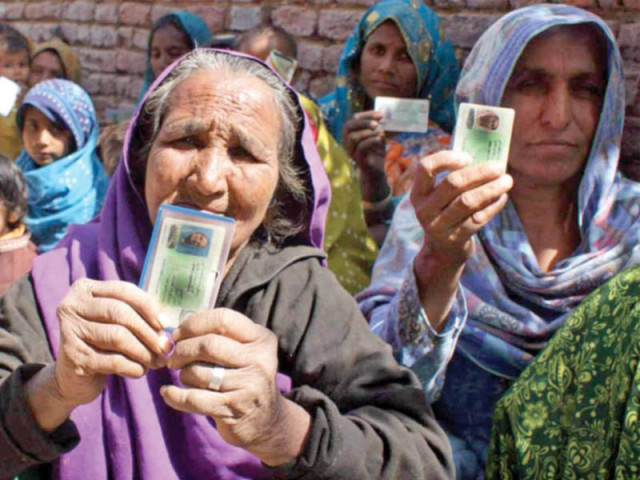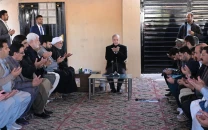ECP to hold re-election if women barred from voting
Amendment to RPA also allows for disqualification of candidates over women disenfranchisement

It is estimated that more than 12.17 million women of 18 years or above – who are otherwise eligible to be registered as voters – are not included in the voters list. PHOTO: INP
The National Assembly, on the last day of its previous session ending on Thursday, amended sections 78 and 103 AAA of the Representation of People Act [RPA], 1976.
The amendment to section 78 ensures that a candidate or his supporters -- if found exerting influence to bar a woman from contesting an election or stop any woman from casting vote, by any means -- be deemed to have committed corrupt practice which will lead to disqualification of such a candidate.
ECP data shows dismal ratio of women voters
And, the amendment to section 103AAA has enhanced powers of the Election Commission of Pakistan [ECP], enabling it to hold a summary inquiry if it gets reports of irregularities in conduct of an election and declare the poll in such constituency null and void.
To make the law more stringent, appeals against the ECP’s decisions could now be filed in the Supreme Court of Pakistan only. Tagged as the Representation of the People [Amendment Bill, 2017], the bill was tabled by the PPP’s Senator Sherry Rehman in Senate as a private member bill.
Approving it in March this year, the upper house had referred the bill to the National Assembly for its nod. After the passage of the legislation, the election authorities would be required to compile gender segregate results of every polling station and of the constituency as a whole.
Underrepresented: Male, female voter disparity rising at alarming rate
There were reports in the previous elections that women in certain constituencies - especially in the remote areas of Khyber-Pakhtunkwa and Balochistan – were restrained from voting under covert agreements among political parties or candidates.
The reports suggested that local politicians, workers of political parties, clerics and community leaders had been part of such secret understanding. Since no male and female segregated data of polled votes was available, it was hard to verify such reports.
Senator Sherry Rehman had tabled another bill that proposed that if the votes polled by women are less than 10 per cent of the total votes polled in a constituency, the ECP should declare the election void and order re-polling within 30 days. The bill is pending in parliament, with many lawmakers averse to it.
However, as a first step to secure women’s right to vote and participate in the election process, the parliament - through the newly adopted law - has enhanced the number of offences that come under corrupt practices.
After the enactment of the new law, which has been sent to the President of Pakistan for his signatures, a decision taken by the ECP under this clause could not be challenged in any court of law except the Supreme Court of Pakistan.
According to the current voters list, Pakistan has 54.57 million male and only 42.42 million female voters. This shows a huge gap of unregistered female voters in the country.
Voting pride: Women’s suffrage makes a wobbly recovery
It is estimated that more than 12.17 million women of 18 years or above – who are otherwise eligible to be registered as voters – are not included in the voters list. The prime reason is that they do not have the Computerised National Identity Cards [CNICs] needed to enlist them in the electoral lists.
The ECP has recently identified 26,000 block codes where there is a more than 12 per cent difference between male and female registered voters. Bridging this gap before the general election due next year is a daunting task for the election authorities.



















COMMENTS
Comments are moderated and generally will be posted if they are on-topic and not abusive.
For more information, please see our Comments FAQ